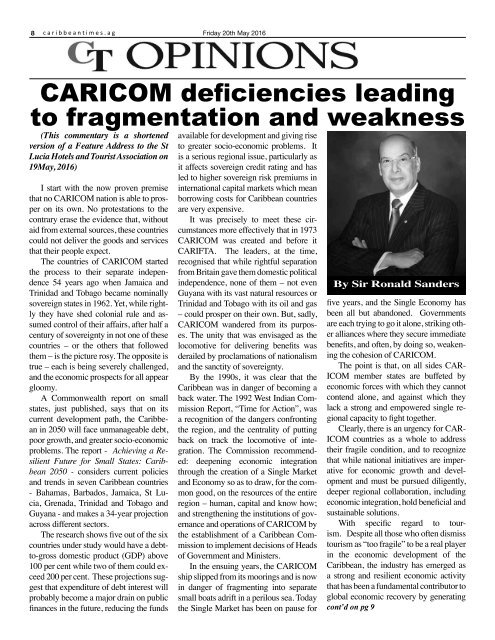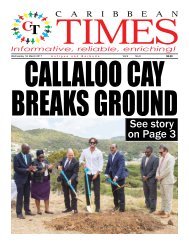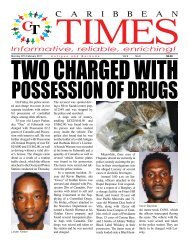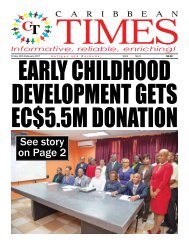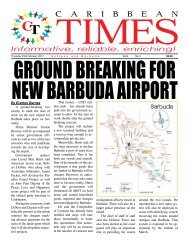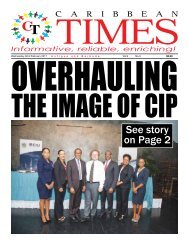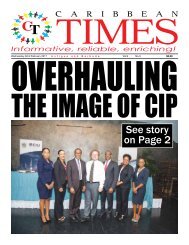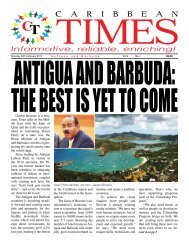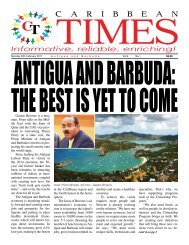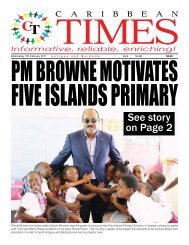Caribbean Times 12th Issue - Friday 20th May 2016
Caribbean Times 12th Issue - Friday 20th May 2016
Caribbean Times 12th Issue - Friday 20th May 2016
Create successful ePaper yourself
Turn your PDF publications into a flip-book with our unique Google optimized e-Paper software.
8 c a r i b b e a n t i m e s . a g<br />
<strong>Friday</strong> <strong>20th</strong> <strong>May</strong> <strong>2016</strong><br />
CARICOM deficiencies leading<br />
to fragmentation and weakness<br />
(This commentary is a shortened<br />
version of a Feature Address to the St<br />
Lucia Hotels and Tourist Association on<br />
19<strong>May</strong>, <strong>2016</strong>)<br />
I start with the now proven premise<br />
that no CARICOM nation is able to prosper<br />
on its own. No protestations to the<br />
contrary erase the evidence that, without<br />
aid from external sources, these countries<br />
could not deliver the goods and services<br />
that their people expect.<br />
The countries of CARICOM started<br />
the process to their separate independence<br />
54 years ago when Jamaica and<br />
Trinidad and Tobago became nominally<br />
sovereign states in 1962. Yet, while rightly<br />
they have shed colonial rule and assumed<br />
control of their affairs, after half a<br />
century of sovereignty in not one of these<br />
countries – or the others that followed<br />
them – is the picture rosy. The opposite is<br />
true – each is being severely challenged,<br />
and the economic prospects for all appear<br />
gloomy.<br />
A Commonwealth report on small<br />
states, just published, says that on its<br />
current development path, the <strong>Caribbean</strong><br />
in 2050 will face unmanageable debt,<br />
poor growth, and greater socio-economic<br />
problems. The report - Achieving a Resilient<br />
Future for Small States: <strong>Caribbean</strong><br />
2050 - considers current policies<br />
and trends in seven <strong>Caribbean</strong> countries<br />
- Bahamas, Barbados, Jamaica, St Lucia,<br />
Grenada, Trinidad and Tobago and<br />
Guyana - and makes a 34-year projection<br />
across different sectors.<br />
The research shows five out of the six<br />
countries under study would have a debtto-gross<br />
domestic product (GDP) above<br />
100 per cent while two of them could exceed<br />
200 per cent. These projections suggest<br />
that expenditure of debt interest will<br />
probably become a major drain on public<br />
finances in the future, reducing the funds<br />
available for development and giving rise<br />
to greater socio-economic problems. It<br />
is a serious regional issue, particularly as<br />
it affects sovereign credit rating and has<br />
led to higher sovereign risk premiums in<br />
international capital markets which mean<br />
borrowing costs for <strong>Caribbean</strong> countries<br />
are very expensive.<br />
It was precisely to meet these circumstances<br />
more effectively that in 1973<br />
CARICOM was created and before it<br />
CARIFTA. The leaders, at the time,<br />
recognised that while rightful separation<br />
from Britain gave them domestic political<br />
independence, none of them – not even<br />
Guyana with its vast natural resources or<br />
Trinidad and Tobago with its oil and gas<br />
– could prosper on their own. But, sadly,<br />
CARICOM wandered from its purposes.<br />
The unity that was envisaged as the<br />
locomotive for delivering benefits was<br />
derailed by proclamations of nationalism<br />
and the sanctity of sovereignty.<br />
By the 1990s, it was clear that the<br />
<strong>Caribbean</strong> was in danger of becoming a<br />
back water. The 1992 West Indian Commission<br />
Report, “Time for Action”, was<br />
a recognition of the dangers confronting<br />
the region, and the centrality of putting<br />
back on track the locomotive of integration.<br />
The Commission recommended:<br />
deepening economic integration<br />
through the creation of a Single Market<br />
and Economy so as to draw, for the common<br />
good, on the resources of the entire<br />
region – human, capital and know how;<br />
and strengthening the institutions of governance<br />
and operations of CARICOM by<br />
the establishment of a <strong>Caribbean</strong> Commission<br />
to implement decisions of Heads<br />
of Government and Ministers.<br />
In the ensuing years, the CARICOM<br />
ship slipped from its moorings and is now<br />
in danger of fragmenting into separate<br />
small boats adrift in a perilous sea. Today<br />
the Single Market has been on pause for<br />
By Sir Ronald Sanders<br />
five years, and the Single Economy has<br />
been all but abandoned. Governments<br />
are each trying to go it alone, striking other<br />
alliances where they secure immediate<br />
benefits, and often, by doing so, weakening<br />
the cohesion of CARICOM.<br />
The point is that, on all sides CAR-<br />
ICOM member states are buffeted by<br />
economic forces with which they cannot<br />
contend alone, and against which they<br />
lack a strong and empowered single regional<br />
capacity to fight together.<br />
Clearly, there is an urgency for CAR-<br />
ICOM countries as a whole to address<br />
their fragile condition, and to recognize<br />
that while national initiatives are imperative<br />
for economic growth and development<br />
and must be pursued diligently,<br />
deeper regional collaboration, including<br />
economic integration, hold beneficial and<br />
sustainable solutions.<br />
With specific regard to tourism.<br />
Despite all those who often dismiss<br />
tourism as “too fragile” to be a real player<br />
in the economic development of the<br />
<strong>Caribbean</strong>, the industry has emerged as<br />
a strong and resilient economic activity<br />
that has been a fundamental contributor to<br />
global economic recovery by generating<br />
cont’d on pg 9


